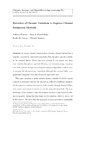Detection of channel variations to improve channel estimation methods

Use este enlace para citar
http://hdl.handle.net/2183/15445Colecciones
- Investigación (FIC) [1685]
Metadatos
Mostrar el registro completo del ítemTítulo
Detection of channel variations to improve channel estimation methodsFecha
2014-08Centro/Dpto/Entidad
Facultade de Informática, Departamento de Electrónica e Sistemas, Grupo de Tecnoloxía Electrónica e Comunicacións (GTEC)Cita bibliográfica
Dapena, A., García-Naya, J., Castro, P. & Zarzoso, V. 2014, "Detection of Channel Variations to Improve Channel Estimation Methods", Circuits, Systems, and Signal Processing, vol. 33, no. 8, pp. 2605-2623.
Resumen
[Abstract] In current digital communication systems, channel information is typically
acquired by supervised approaches that use pilot symbols included in the transmit
frames. Given that pilot symbols do not convey user data, they penalize throughput
spectral efficiency, and transmit energy consumption of the system. Unsupervised
channel estimation algorithms could be used to mitigate the aforementioned drawbacks
although they present higher computational complexity than that offered by
supervised ones. This paper proposes a simple decision method suitable for slowly
varying channels to determine whether the channel has suffered a significant variation,
which requires to estimate the matrix of the recently changed channel. Otherwise, a
previous estimate is used to recover the transmitted symbols. The main advantage of
this method is that the decision criterion is only based on information acquired during
the time frame synchronization, which is carried out at the receiver. We show that the
proposed criterion provides a considerable improvement of computational complexity
for both supervised and unsupervised methods, without incurring in a penalization in
terms of symbol error ratio. Specifically, we consider systems that make use of the popular
Alamouti code. Performance evaluation is accomplished by means of simulated
channels as well as making use of indoor wireless channels measured using a testbed.
Palabras clave
Channel estimation
Supervised approach
Unsupervised approach
Alamouti code
Supervised approach
Unsupervised approach
Alamouti code
Descripción
“The final publication is available at Springer via http://dx.doi.org/[10.1007/s00034-014-9767-8]”
Versión del editor
ISSN
0278-081X (Print)
1531-5878 (Online)
1531-5878 (Online)





